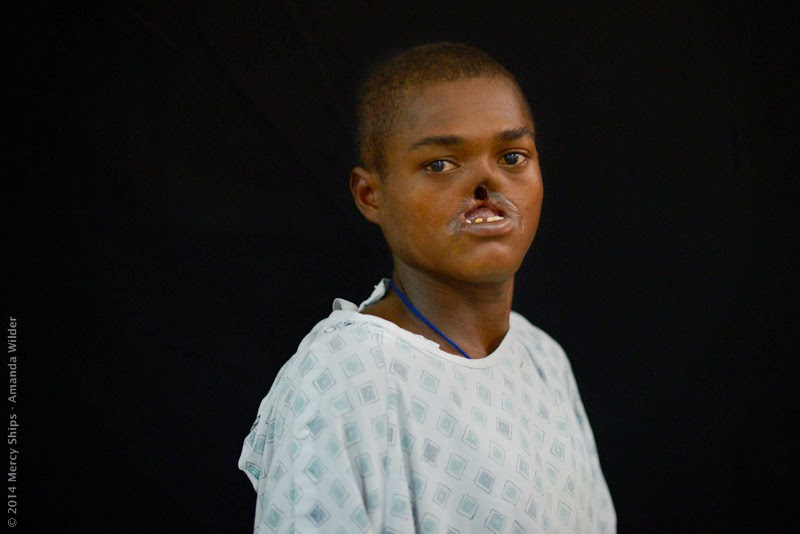change.
Change is very normal in this place. You live with a
constant fluctuation of bunkmates & friends as the crew of ~400 is ever
rotating, some staying for weeks, some for months, some for years.
Since I
arrived on the ship in early August, I have worked in the dining room (in the
Canary Islands and on the sail to South Africa), as an ‘official ship tour
guide’ in Cape Town, as a nurse preceptor while the new-to-Mercy-Ships nurses
were in orientation in late October when we finally arrived in Madagascar, and
primarily as a charge nurse on the maxillo-facial ward since then. I have, over
the course of the past 4+ months since the ship’s hospital officially opened
for the Madagascar field service, worked on all 3 wards, in 4 different
specialties (max-fax, general surgery, orthopedic surgery, and plastic
surgery).
On this ship, I have given many a medication and nasogastric feed,
changed dressings, pulled out drains and packs, done mean but necessary things
with needles, prepped patients for surgery and settled them post-operatively,
participated in countless physician rounds and carried out orders. I have made
a ton of kids cry (my specialty as a pediatric nurse), but I have also gotten the
opportunity to give pep talks to tired mamas or discouraged teenagers, to play
Jenga and to have dance parties, to go on wagon rides and walks in the hall, to
paint nails and do crafts and learn local songs, and to pray—rejoicing over
good news and healing and asking for comfort and guidance in cases of sad news.
Some other hats I’ve worn in the past several months: Data collector
and analyzer (Pediatric surgical and anesthetic research project). Language
student (French, Malagasy, and “proper” English—courtesy of my UK friends :D).
Editor (health education manuals for community health workers). Educator (day
crew + training other charge nurses). Ballet Teacher (Pre-K-Grade 5 girls on
the ship). Yogalates instructor. Babysitter. Friend. Girlfriend.
In mid-January my role on the ship shifted a little once
again. Can I let you in on a secret? It was my favorite role. In addition to
acting as charge nurse on D ward, I was also paired with Malagasy nurses from
“Hopital Be” as part of the local nurse education program (PUMP). Each week I
spent one or two days at the local hospital and one or two days with a local
nurse in the Africa Mercy’s hospital. The program is set up for us to be
partners. Not one greater than the other. We are both teachers. We are both students.
And I love that.
It had been a while since I’d worked in an under-resourced
hospital, taking me back to the years of working at Agule Community Health
Centre, a small rural clinic in Uganda. Besides a few days at a clinic in the
Congo in late 2013 when I was on the ship for the first time, I have either
worked at Duke University Hospital or at the hospital aboard the Africa Mercy,
which isn’t as well-equipped as Duke but in comparison to rural hospitals, we
have all we need and more.
I’m not sure how the days of my life will be filled, but I
yearn for some of my days to have something to do with international nurse
education and improving nursing care in under-resourced settings. And as
excited as I am by that prospect, I am terrified. This work is hard. There is
no secret recipe or quick fix. There is a lot you must fight against. There is a scary amount of room for flops and failure. I realized all this anew through my time
with the local nurses here in Madagascar.
Some of the questions that I wrestled with during this program:
- How do you talk about best practice when best practice is limited by doing the best you can with the little you have?
- How do you motivate when hours are long and pay is poor and staffing ratios are incredulous and resources are severely lacking?
- How do build trust when you don’t speak the same language?
- How do you teach and dialogue effectively when you come from such different backgrounds and realities of nursing?
- How do you avoid being perceived (and actually being!) as the white foreign know-it-all who traipses in and tries to “`fix” everything, which actually results in more harm than help?
- If the whole wheel seems broken, does it even matter if you just repair one spoke?
I am determined to keep working toward answers to these questions, and to glean from the wisdom and experience of those who have been wrestling with such questions for years. This is me making a commitment to embrace change (even when a large part of myself wants to fight against it), because if I want to see change in the world, I must first be willing to see it in myself.
join me?
 |
| Hopital Be: The local hospital in Tamatave & the most common form of transport here: pousse-pousse |
 |
| The fabulous nurses from the pediatric local nurse education program at our final celebration luncheon! |
 |
| Practicing NG feeds during one of the education days on the ship. Sendra, our program translator made for an excellent "patient" ;) |




Comments
Post a Comment